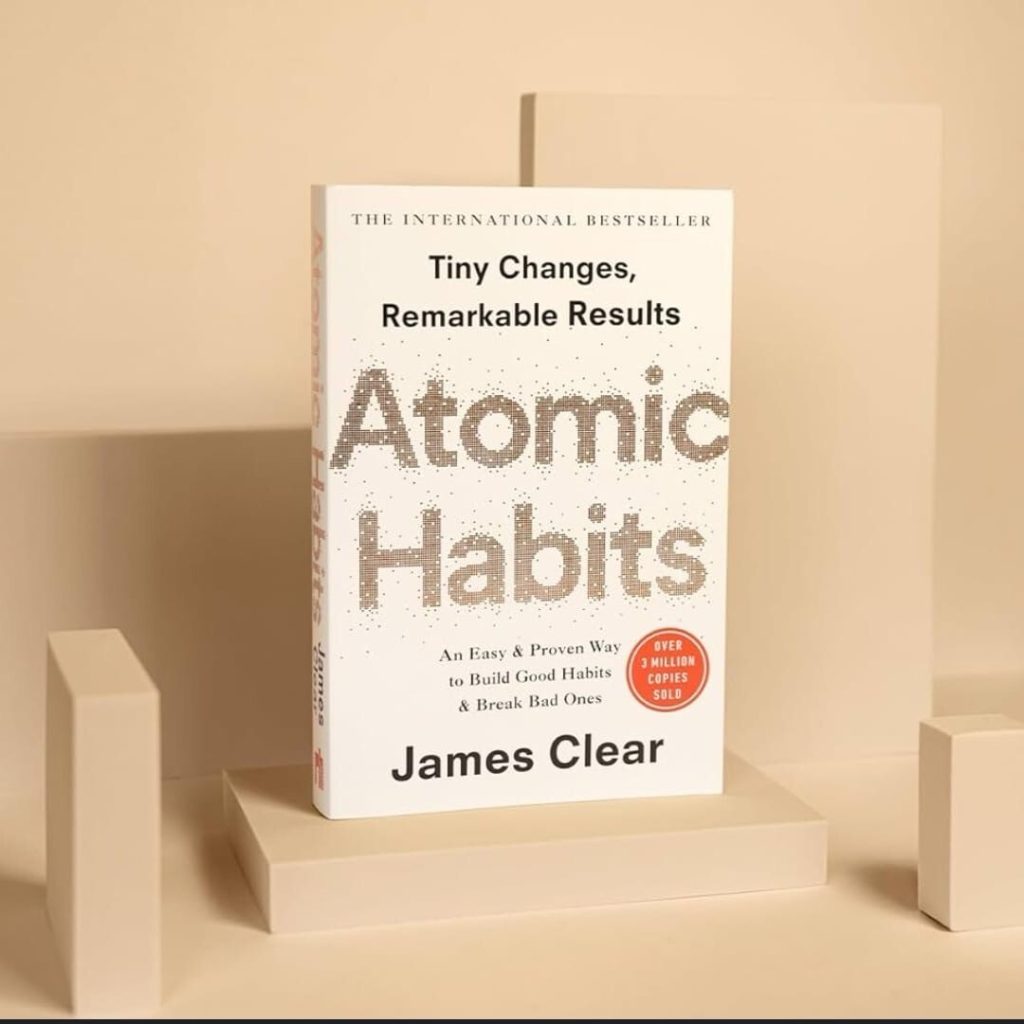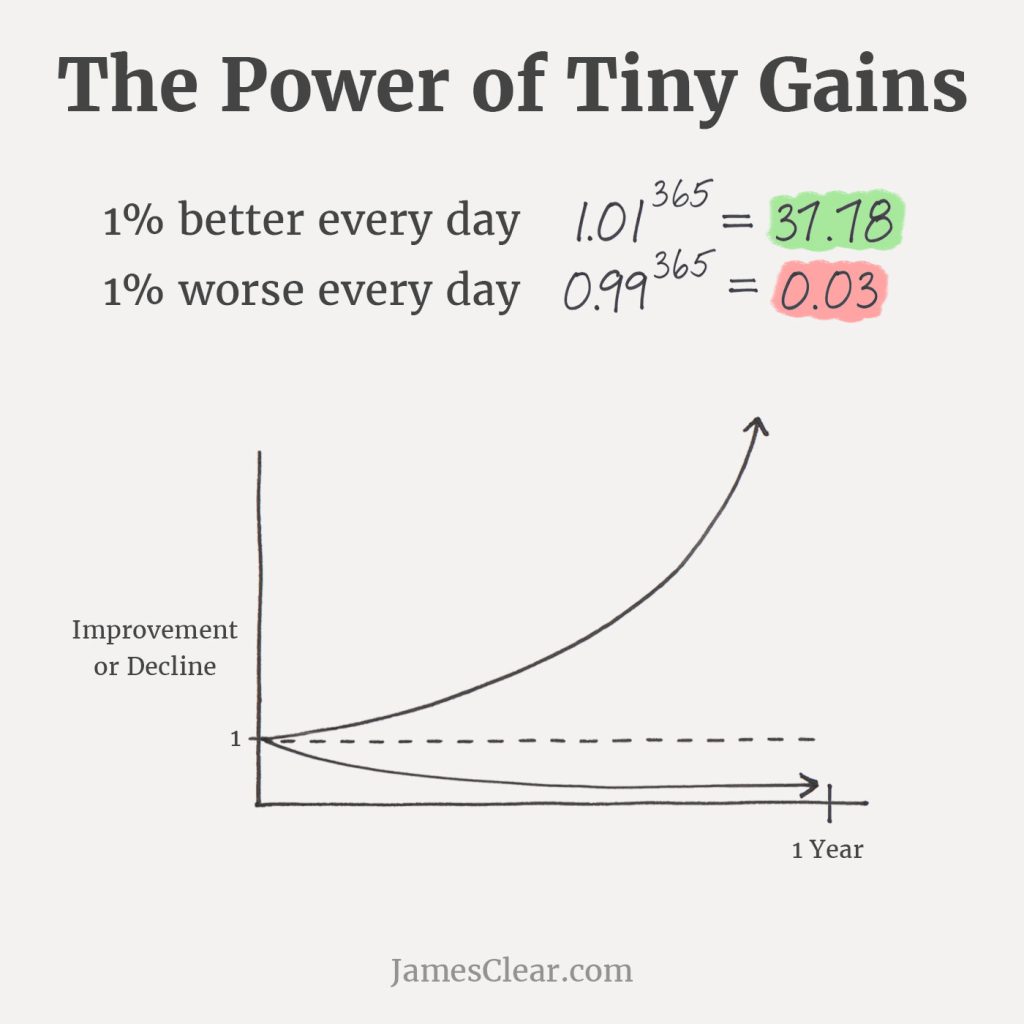Why Small Habits Matter More Than Big Goals
Have you ever promised yourself at the beginning of the school year that this time, I’ll stay on top of my homework, read more, and not pull all-nighters – only to end up back in the same cycle a few weeks later?
Yeah, same here many years ago.
The truth is, most of us don’t struggle with setting goals. We’re pretty good at it – “get straight As,” “read more books,” “work out every day,” or “spend less time on TikTok.” The real challenge is sticking with those goals long enough to see results.
That’s where James Clear’s book Atomic Habits comes in. Even if you’ve never read it, the ideas are simple but life-changing: success isn’t about massive overnight changes – it’s about tiny habits that compound over time. Think of it as interest on your savings account, but for your study skills, health, and mindset.
In this article, I’ll break down how students can apply the principles of Atomic Habits to build better routines – not just for studying, but for living a calmer, more intentional life.

The Atomic Habits Formula
James Clear introduces a powerful formula:
“You do not rise to the level of your goals. You fall to the level of your systems.”
What does this mean for you as a student? It means instead of obsessing over “I want to get into X university” or “I need a perfect GPA,” you should focus on building the daily systems (habits) that will carry you there.
Here’s the simple breakdown:
-
Cue – the trigger that starts the habit.
-
Craving – the desire behind it.
-
Response – the action you take.
-
Reward – the outcome that reinforces the behavior.
Let’s apply this to student life.
Example: You want to review your notes every day.
-
Cue: Place your notebook on your desk before bed.
-
Craving: You want to feel prepared and less stressed.
-
Response: You open it for 10 minutes after school.
-
Reward: You feel accomplished, and studying for exams becomes way less overwhelming.
Start Small: The 1% Rule
If you take only one idea from Atomic Habits, let it be this:
Small improvements, done consistently, add up to massive results.
Instead of saying, “I’m going to study 5 hours every day,” try “I’ll review one flashcard set for 10 minutes.” Instead of “I’ll run 10km every morning,” try “I’ll put on my sneakers and walk for 5 minutes.”
Why? Because habits compound. 1% better every day may feel tiny, but by the end of a year, you’re 37 times better. That’s the math James Clear shares – and it’s the science behind why starting small actually works.

Habit #1: Make Studying Easy (and Kinda Fun)
Let’s be real: staring at a thick textbook for hours is not fun. The trick is to make studying frictionless:
-
Environment matters: Keep your desk clean, and put your phone in another room (or at least on “Do Not Disturb”).
-
Use habit stacking: Pair a habit you want to build with one you already have. For example, “After I drink my morning coffee, I’ll open my notes for 15 minutes.”
-
Gamify it: Use timers (Pomodoro method), colorful pens, or study playlists. If you’re into apps, try Notion or Forest to make it feel more engaging.
The key: don’t rely on motivation, rely on systems. If studying feels easy to start, you’re way more likely to follow through.
Habit #2: Build Routines That Balance School and Life
Atomic habits are for your whole lifestyle. Balance is what keeps you from burning out.
Here are three routines students can try:
-
Morning Ritual: Instead of rolling out of bed and scrolling TikTok, try stretching for 5 minutes, writing one line in a journal, or reading one page of a book. This sets a calmer tone for your day.
-
Study Ritual: Light a candle, put on your “study playlist,” and start with just 10 minutes of focused work. Rituals make studying automatic.
-
Evening Ritual: Reflect on one win of the day (no matter how small) and prep your bag for tomorrow. Ending with gratitude makes you sleep better too.
Habit #3: Surround Yourself with the Right People
James Clear writes: “You don’t have to be the victim of your environment. You can also be the architect of it.”
Think about your friends. If everyone around you procrastinates, skips class, or only crams the night before, guess what? You’ll do the same. But if you surround yourself with people who study consistently, dream big, and encourage each other—you’ll naturally level up.
For Gen Z, this can also mean joining online communities (Discord groups, study YouTube, or #StudyTok). Just make sure they inspire you, not stress you out.
Habit #4: Focus on Identity, Not Just Results
Instead of saying “I want to get an A in math,” say “I am the kind of student who reviews math every day.”
Identity-based habits are powerful because they shift how you see yourself. When you think of yourself as a runner, reader, or consistent student, your actions will follow.
So ask yourself: Who do I want to become?
Then design tiny daily actions that align with that identity.
Breaking Bad Habits
Of course, habits aren’t just about building good ones. It’s also about breaking the ones holding you back – like doom-scrolling at midnight or snacking every time you’re stressed.
Here’s how to break them:
-
Make it invisible: Hide the snacks. Delete distracting apps.
-
Make it unattractive: Remind yourself of the downside (e.g., “If I stay up until 2AM, tomorrow I’ll feel miserable.”).
-
Make it difficult: Add steps. For example, if you want less social media, log out each time.
-
Make it unsatisfying: Use an accountability buddy. Promise to send a study update every night.
Real-Life Student Example: My Own University Journey
Back when I was studying Business & Management (with a focus in Finance) and also minoring in Fine Arts, life was busy. Between finance lectures, group projects, case studies, and then switching gears to work on creative art assignments, I often felt like I was juggling two different worlds.
At first, I tried to just “push through” with willpower – late nights, endless coffee, last-minute cramming. But it wasn’t sustainable. That’s when I started experimenting with small, consistent habits.
Here’s how I applied Atomic Habits (even before I knew the book existed):
-
Cue: Every night, after finishing dinner, I would clear my desk and put the most urgent project file on top.
-
Craving: I wanted to feel less overwhelmed by deadlines and more in control of my workload.
-
Response: I committed to spending just 20 minutes reviewing or preparing for the next day’s classes or projects. Sometimes it stretched into hours, but the rule was to at least start.
-
Reward: Over time, I realized my stress dropped. I didn’t have to panic before presentations, and I could even make space for art projects without guilt.
Those tiny steps compounded. Instead of all-nighters, I was moving steadily through my workload. Looking back, it wasn’t about “working harder” but about designing systems that made it easier to succeed.
Final Thoughts: Tiny Steps, Big Change
If there’s one thing to remember, it’s this: you don’t need to overhaul your life overnight.
Start small. Celebrate tiny wins. And remember: habits aren’t about becoming someone else—they’re about becoming more of who you already want to be.
As James Clear says:
Every action you take is a vote for the type of person you wish to become.
So cast your votes wisely, every single day.

